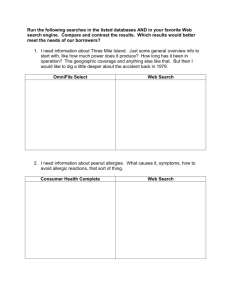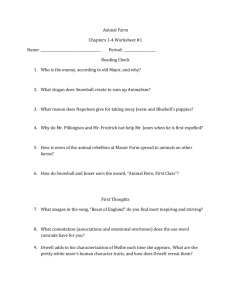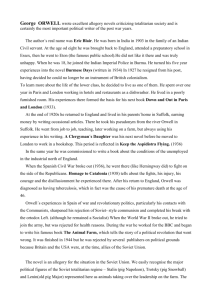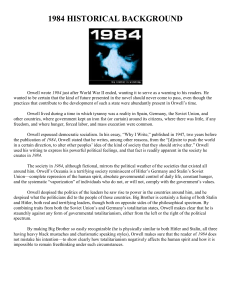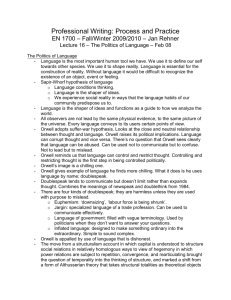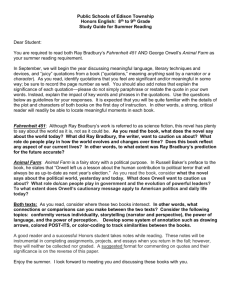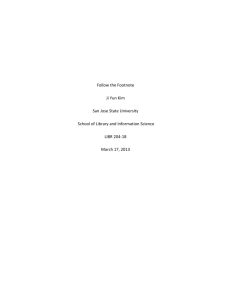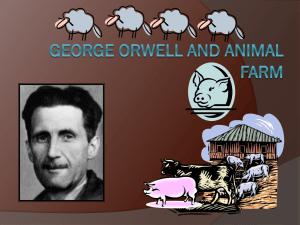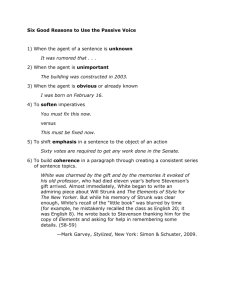1984 George Orwell- Historical/Biographical Context http://www
advertisement
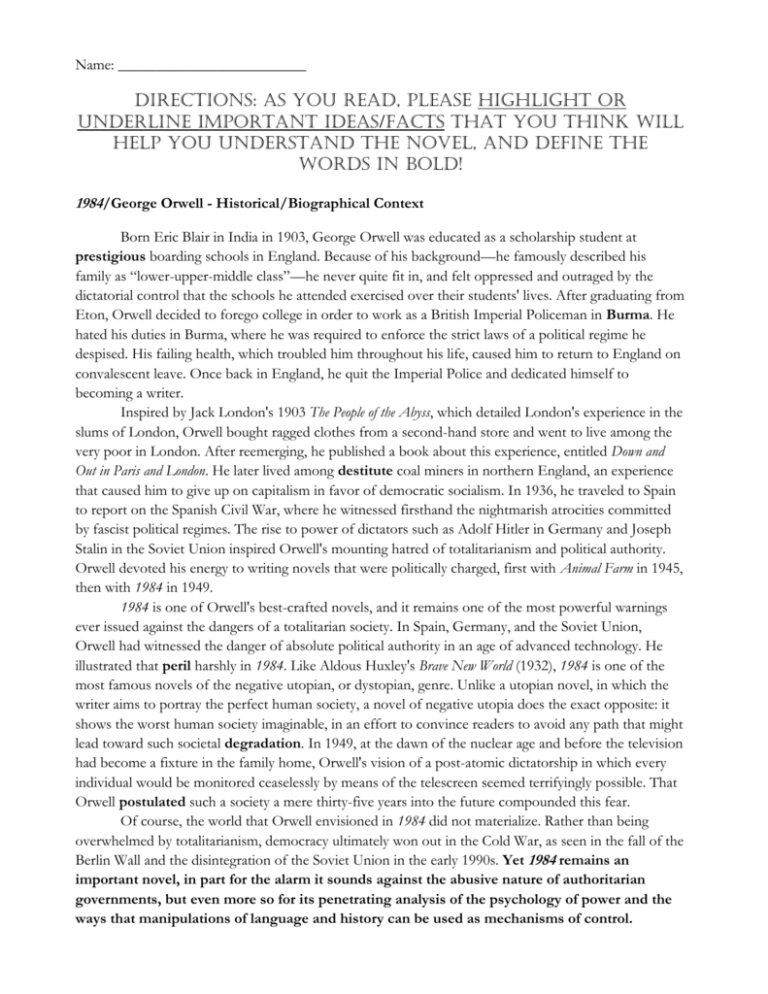
Name: _________________________ Directions: As you read, please highlight or underline important ideas/facts that you think will help you understand the novel, and define the words in bold! 1984/George Orwell - Historical/Biographical Context Born Eric Blair in India in 1903, George Orwell was educated as a scholarship student at prestigious boarding schools in England. Because of his background—he famously described his family as “lower-upper-middle class”—he never quite fit in, and felt oppressed and outraged by the dictatorial control that the schools he attended exercised over their students' lives. After graduating from Eton, Orwell decided to forego college in order to work as a British Imperial Policeman in Burma. He hated his duties in Burma, where he was required to enforce the strict laws of a political regime he despised. His failing health, which troubled him throughout his life, caused him to return to England on convalescent leave. Once back in England, he quit the Imperial Police and dedicated himself to becoming a writer. Inspired by Jack London's 1903 The People of the Abyss, which detailed London's experience in the slums of London, Orwell bought ragged clothes from a second-hand store and went to live among the very poor in London. After reemerging, he published a book about this experience, entitled Down and Out in Paris and London. He later lived among destitute coal miners in northern England, an experience that caused him to give up on capitalism in favor of democratic socialism. In 1936, he traveled to Spain to report on the Spanish Civil War, where he witnessed firsthand the nightmarish atrocities committed by fascist political regimes. The rise to power of dictators such as Adolf Hitler in Germany and Joseph Stalin in the Soviet Union inspired Orwell's mounting hatred of totalitarianism and political authority. Orwell devoted his energy to writing novels that were politically charged, first with Animal Farm in 1945, then with 1984 in 1949. 1984 is one of Orwell's best-crafted novels, and it remains one of the most powerful warnings ever issued against the dangers of a totalitarian society. In Spain, Germany, and the Soviet Union, Orwell had witnessed the danger of absolute political authority in an age of advanced technology. He illustrated that peril harshly in 1984. Like Aldous Huxley's Brave New World (1932), 1984 is one of the most famous novels of the negative utopian, or dystopian, genre. Unlike a utopian novel, in which the writer aims to portray the perfect human society, a novel of negative utopia does the exact opposite: it shows the worst human society imaginable, in an effort to convince readers to avoid any path that might lead toward such societal degradation. In 1949, at the dawn of the nuclear age and before the television had become a fixture in the family home, Orwell's vision of a post-atomic dictatorship in which every individual would be monitored ceaselessly by means of the telescreen seemed terrifyingly possible. That Orwell postulated such a society a mere thirty-five years into the future compounded this fear. Of course, the world that Orwell envisioned in 1984 did not materialize. Rather than being overwhelmed by totalitarianism, democracy ultimately won out in the Cold War, as seen in the fall of the Berlin Wall and the disintegration of the Soviet Union in the early 1990s. Yet 1984 remains an important novel, in part for the alarm it sounds against the abusive nature of authoritarian governments, but even more so for its penetrating analysis of the psychology of power and the ways that manipulations of language and history can be used as mechanisms of control. Totalitarianism In 1948, when Orwell's 1984 was published, World War II had just ended. One of England's allies had been Russia, which was ruled by a despotic dictator named Joseph Stalin. Stalin ruled with an iron fist and was famous for his midnight purges; he would round up hundreds of citizens at a time and murder them in deserted areas, much as Oceania citizens in 1984 are "vaporized." Stalin's victims were his imagined enemies, such as political dissidents, artists, or Jews. Meanwhile, Adolf Hitler in Germany had slaughtered his enemies as well, in the end killing six million Jews plus nine million Slavs, gypsies, political dissidents, homosexuals, and mentally challenged people. Mao Tse-tung in China was fighting for communism against Chinese nationalist forces under Chiang Kai-shek. Mao would finally defeat the nationalists in 1949 and begin a long, oppressive totalitarian regime. Other dictators of the time included Francisco Franco in Spain and Benito Mussolini in Italy. These oppressive rulers controlled citizens through propaganda and violence. This state of affairs prompted Orwell to create the idea of Big Brother, the ultimate totalitarian leader who dominates all political, social, and economic activities. Socialism and Communism Orwell fought against Franco in the Spanish Civil War in the mid-1930s, supporting the socialist left. He was not a communist, but a dedicated Democratic socialist who believed that the government, not private enterprise, should control the production and distribution of goods, and as such he was greatly concerned about the lives of the poor and working class. All over the world, throughout the twentieth century, working class people had been fighting for better lives. In America, workers fought a long and hard battle for labor reforms that would eventually include such benefits as job security, safety regulation, overtime and hazardous duty pay, vacation and sick days, health insurance, pensions, disability, and child labor laws, which modern workers sometimes take for granted. Some U.S. and British workers turned to socialism and communism, thinking that perhaps these alternate forms of economic and social structure would solve their problems. In the late nineteenth century, Karl Marx of Germany proposed that to resolve the gross inequality between the workers and the bosses, the working class, or proletariat, would have to revolt and establish a new communist regime in which the people would control the political and economic systems. He believed workers ought to own their farms and factories and distribute the profits evenly among workers. Here in America, the capitalist factory and mine owners eventually conceded to labor's demands and the socialists and communists were marginalized. This act deferred American workers from revolting against their government. Communist revolutions did occur in Russia and in China, but eventually those countries modified their economic systems. America's response to communism was extreme during the Cold War era of the 1950s; in fact, many people believed the U.S. government was acting just as oppressively as communist governments were. Under the leadership of Senator Joe McCarthy, the House (of Representatives) Committee on UnAmerican Activities aggressively attacked public figures who were suspected communists, demanding that they name other communists or be blackballed in their industries. Hollywood writers and filmmakers were especially hard hit by the mania and many careers were destroyed before President Truman and public opinion turned against McCarthy and the witch hunt ended. The paranoia that characterized the McCarthy era was similar to the paranoia in 1984, as people were pressured to betray their friends, co-workers, and even parents in order to save themselves. Today, communism still has some followers in the United States and England, as does Democratic socialism, which Orwell embraced wholeheartedly. Television Aside from being concerned about labor and government, Orwell was very aware of an important invention that was just becoming popular after World War II and would eventually be a dominant force in Western culture: the television. The first BBC broadcast in Britain occurred in 1937, and TV was first demonstrated to the American public in 1939 at the New York World's Fair. Television's popularity grew enormously throughout the 1950s, and today 98% of American households own at least one television. Orwell recognized the enormous potential of this communication tool, which would soon be in every home. He imagined that the television could one day not only broadcast propaganda nonstop but that it could transmit back images of action in front of the screen, allowing the broadcaster to spy on its viewers. Homework In order to read and interpret the novel through the historical and biographical lenses (meaning, to understand the novel in the context of the historical background and personal background of the author), you first need to learn about the author and the time period in which he lived. After reading the background information, write down 5 specific facts in complete sentences in your own words. One example is provided. Biographical Information on George Orwell Example: Orwell’s father was a British civil servant who was in charge of running the opium trade in India (this information is from another source). 1. ______________________________________________________________________ 2. ______________________________________________________________________ 3. ______________________________________________________________________ 4. ______________________________________________________________________ 5. ______________________________________________________________________ Historical Context of 1984 6. ______________________________________________________________________ 7. ______________________________________________________________________ 8. ______________________________________________________________________ 9. ______________________________________________________________________ 10. ______________________________________________________________________ In your own words, restate the sentence in bold towards the bottom of the first page (the sentence that starts with “Yet 1984 remains an important novel…”): _________________________________________________________________________________ _________________________________________________________________________________ _________________________________________________________________________________ _________________________________________________________________________________ _________________________________________________________________________________ What is/where is Burma? DEFINE the following words: prestigious: destitute: peril: degradation: postulated: purge: concede: marginalize: defer: blackballed: socialism: communism: totalitarianism: OTHER WORDS NEW TO YOU:
